Business Law Report: Sources of Law and Business Organizations
VerifiedAdded on 2021/01/02
|13
|4849
|436
Report
AI Summary
This report provides a comprehensive overview of business law, focusing on the UK legal system. It begins by exploring the sources of law, differentiating between primary and secondary sources such as case law, legislation, and legal publications. The report then examines the role of the government in law-making and the application of statutory and common law within the justice system. A significant portion of the report analyzes the impact of company, employment, and contract law on businesses, providing specific examples to illustrate these impacts. Furthermore, it differentiates between legislation, regulations, and standards, assessing their potential effects on business operations. The report delves into the legal formation, management, and funding of various types of business organizations, evaluating their advantages and disadvantages. Finally, it explores legal solutions for dispute resolution, comparing and contrasting different sources of legal advice and support, and evaluating the effectiveness of these solutions.
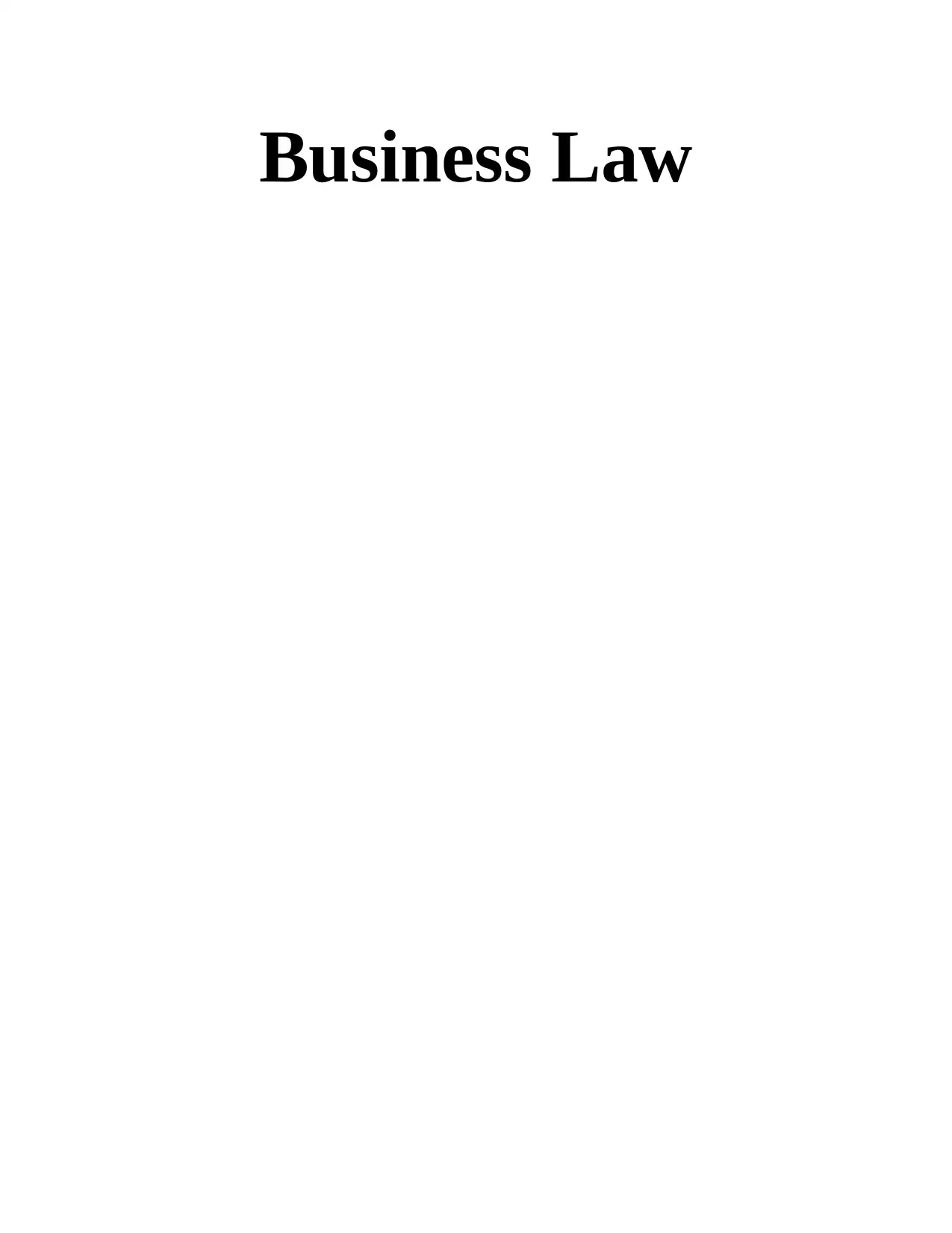
Business Law
Paraphrase This Document
Need a fresh take? Get an instant paraphrase of this document with our AI Paraphraser
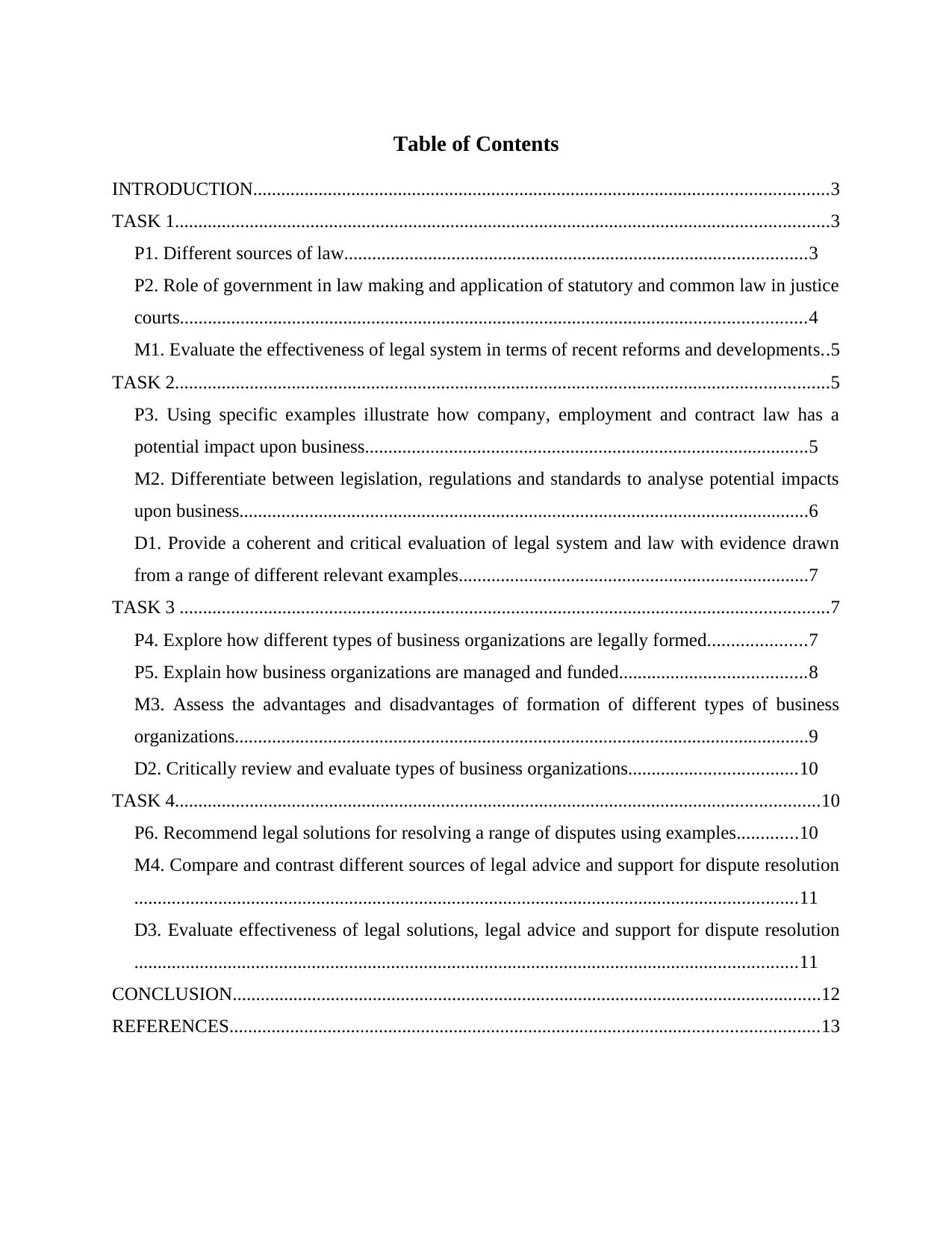
Table of Contents
INTRODUCTION...........................................................................................................................3
TASK 1............................................................................................................................................3
P1. Different sources of law...................................................................................................3
P2. Role of government in law making and application of statutory and common law in justice
courts......................................................................................................................................4
M1. Evaluate the effectiveness of legal system in terms of recent reforms and developments..5
TASK 2............................................................................................................................................5
P3. Using specific examples illustrate how company, employment and contract law has a
potential impact upon business...............................................................................................5
M2. Differentiate between legislation, regulations and standards to analyse potential impacts
upon business..........................................................................................................................6
D1. Provide a coherent and critical evaluation of legal system and law with evidence drawn
from a range of different relevant examples...........................................................................7
TASK 3 ...........................................................................................................................................7
P4. Explore how different types of business organizations are legally formed.....................7
P5. Explain how business organizations are managed and funded........................................8
M3. Assess the advantages and disadvantages of formation of different types of business
organizations...........................................................................................................................9
D2. Critically review and evaluate types of business organizations....................................10
TASK 4..........................................................................................................................................10
P6. Recommend legal solutions for resolving a range of disputes using examples.............10
M4. Compare and contrast different sources of legal advice and support for dispute resolution
..............................................................................................................................................11
D3. Evaluate effectiveness of legal solutions, legal advice and support for dispute resolution
..............................................................................................................................................11
CONCLUSION..............................................................................................................................12
REFERENCES..............................................................................................................................13
INTRODUCTION...........................................................................................................................3
TASK 1............................................................................................................................................3
P1. Different sources of law...................................................................................................3
P2. Role of government in law making and application of statutory and common law in justice
courts......................................................................................................................................4
M1. Evaluate the effectiveness of legal system in terms of recent reforms and developments..5
TASK 2............................................................................................................................................5
P3. Using specific examples illustrate how company, employment and contract law has a
potential impact upon business...............................................................................................5
M2. Differentiate between legislation, regulations and standards to analyse potential impacts
upon business..........................................................................................................................6
D1. Provide a coherent and critical evaluation of legal system and law with evidence drawn
from a range of different relevant examples...........................................................................7
TASK 3 ...........................................................................................................................................7
P4. Explore how different types of business organizations are legally formed.....................7
P5. Explain how business organizations are managed and funded........................................8
M3. Assess the advantages and disadvantages of formation of different types of business
organizations...........................................................................................................................9
D2. Critically review and evaluate types of business organizations....................................10
TASK 4..........................................................................................................................................10
P6. Recommend legal solutions for resolving a range of disputes using examples.............10
M4. Compare and contrast different sources of legal advice and support for dispute resolution
..............................................................................................................................................11
D3. Evaluate effectiveness of legal solutions, legal advice and support for dispute resolution
..............................................................................................................................................11
CONCLUSION..............................................................................................................................12
REFERENCES..............................................................................................................................13
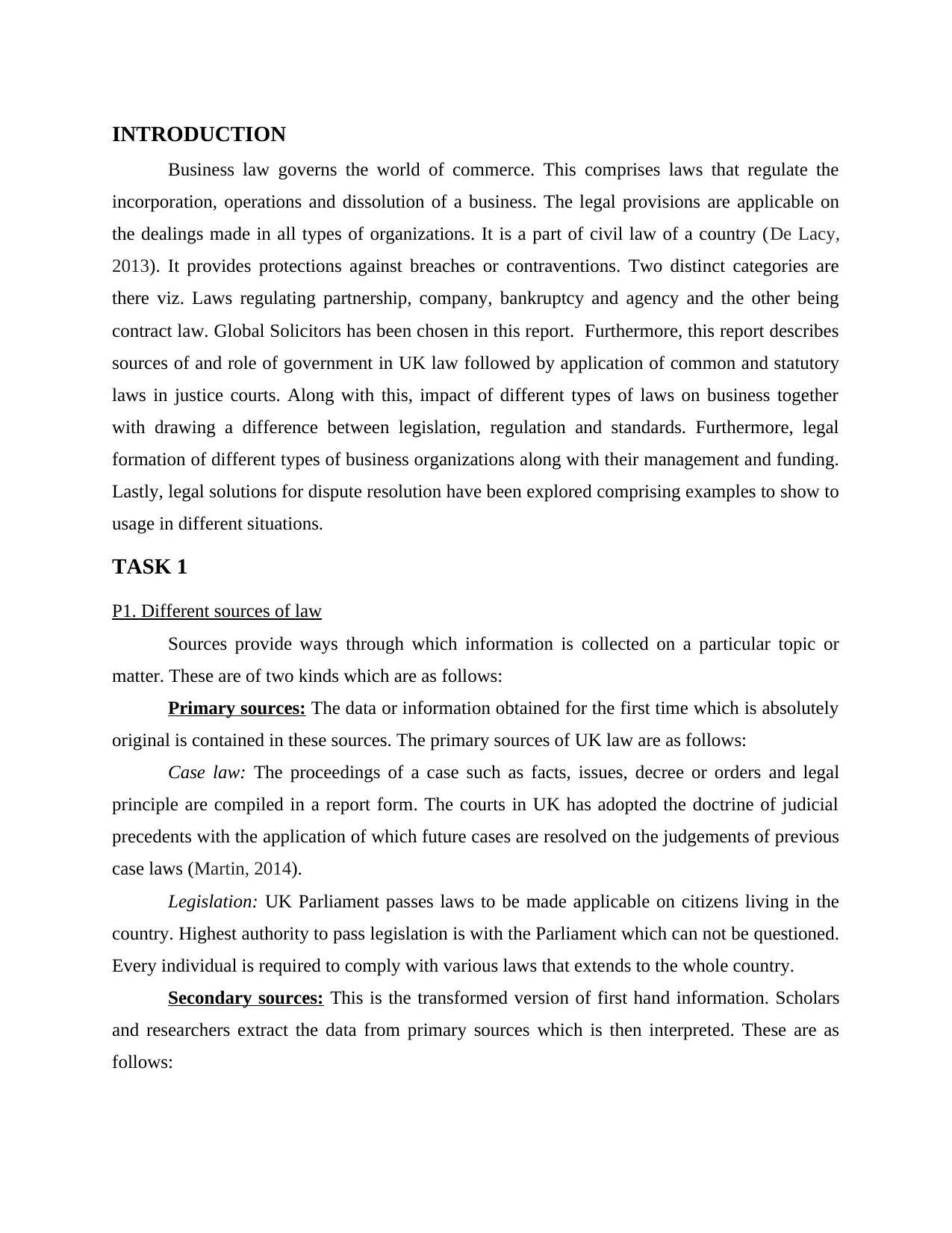
INTRODUCTION
Business law governs the world of commerce. This comprises laws that regulate the
incorporation, operations and dissolution of a business. The legal provisions are applicable on
the dealings made in all types of organizations. It is a part of civil law of a country (De Lacy,
2013). It provides protections against breaches or contraventions. Two distinct categories are
there viz. Laws regulating partnership, company, bankruptcy and agency and the other being
contract law. Global Solicitors has been chosen in this report. Furthermore, this report describes
sources of and role of government in UK law followed by application of common and statutory
laws in justice courts. Along with this, impact of different types of laws on business together
with drawing a difference between legislation, regulation and standards. Furthermore, legal
formation of different types of business organizations along with their management and funding.
Lastly, legal solutions for dispute resolution have been explored comprising examples to show to
usage in different situations.
TASK 1
P1. Different sources of law
Sources provide ways through which information is collected on a particular topic or
matter. These are of two kinds which are as follows:
Primary sources: The data or information obtained for the first time which is absolutely
original is contained in these sources. The primary sources of UK law are as follows:
Case law: The proceedings of a case such as facts, issues, decree or orders and legal
principle are compiled in a report form. The courts in UK has adopted the doctrine of judicial
precedents with the application of which future cases are resolved on the judgements of previous
case laws (Martin, 2014).
Legislation: UK Parliament passes laws to be made applicable on citizens living in the
country. Highest authority to pass legislation is with the Parliament which can not be questioned.
Every individual is required to comply with various laws that extends to the whole country.
Secondary sources: This is the transformed version of first hand information. Scholars
and researchers extract the data from primary sources which is then interpreted. These are as
follows:
Business law governs the world of commerce. This comprises laws that regulate the
incorporation, operations and dissolution of a business. The legal provisions are applicable on
the dealings made in all types of organizations. It is a part of civil law of a country (De Lacy,
2013). It provides protections against breaches or contraventions. Two distinct categories are
there viz. Laws regulating partnership, company, bankruptcy and agency and the other being
contract law. Global Solicitors has been chosen in this report. Furthermore, this report describes
sources of and role of government in UK law followed by application of common and statutory
laws in justice courts. Along with this, impact of different types of laws on business together
with drawing a difference between legislation, regulation and standards. Furthermore, legal
formation of different types of business organizations along with their management and funding.
Lastly, legal solutions for dispute resolution have been explored comprising examples to show to
usage in different situations.
TASK 1
P1. Different sources of law
Sources provide ways through which information is collected on a particular topic or
matter. These are of two kinds which are as follows:
Primary sources: The data or information obtained for the first time which is absolutely
original is contained in these sources. The primary sources of UK law are as follows:
Case law: The proceedings of a case such as facts, issues, decree or orders and legal
principle are compiled in a report form. The courts in UK has adopted the doctrine of judicial
precedents with the application of which future cases are resolved on the judgements of previous
case laws (Martin, 2014).
Legislation: UK Parliament passes laws to be made applicable on citizens living in the
country. Highest authority to pass legislation is with the Parliament which can not be questioned.
Every individual is required to comply with various laws that extends to the whole country.
Secondary sources: This is the transformed version of first hand information. Scholars
and researchers extract the data from primary sources which is then interpreted. These are as
follows:
⊘ This is a preview!⊘
Do you want full access?
Subscribe today to unlock all pages.

Trusted by 1+ million students worldwide
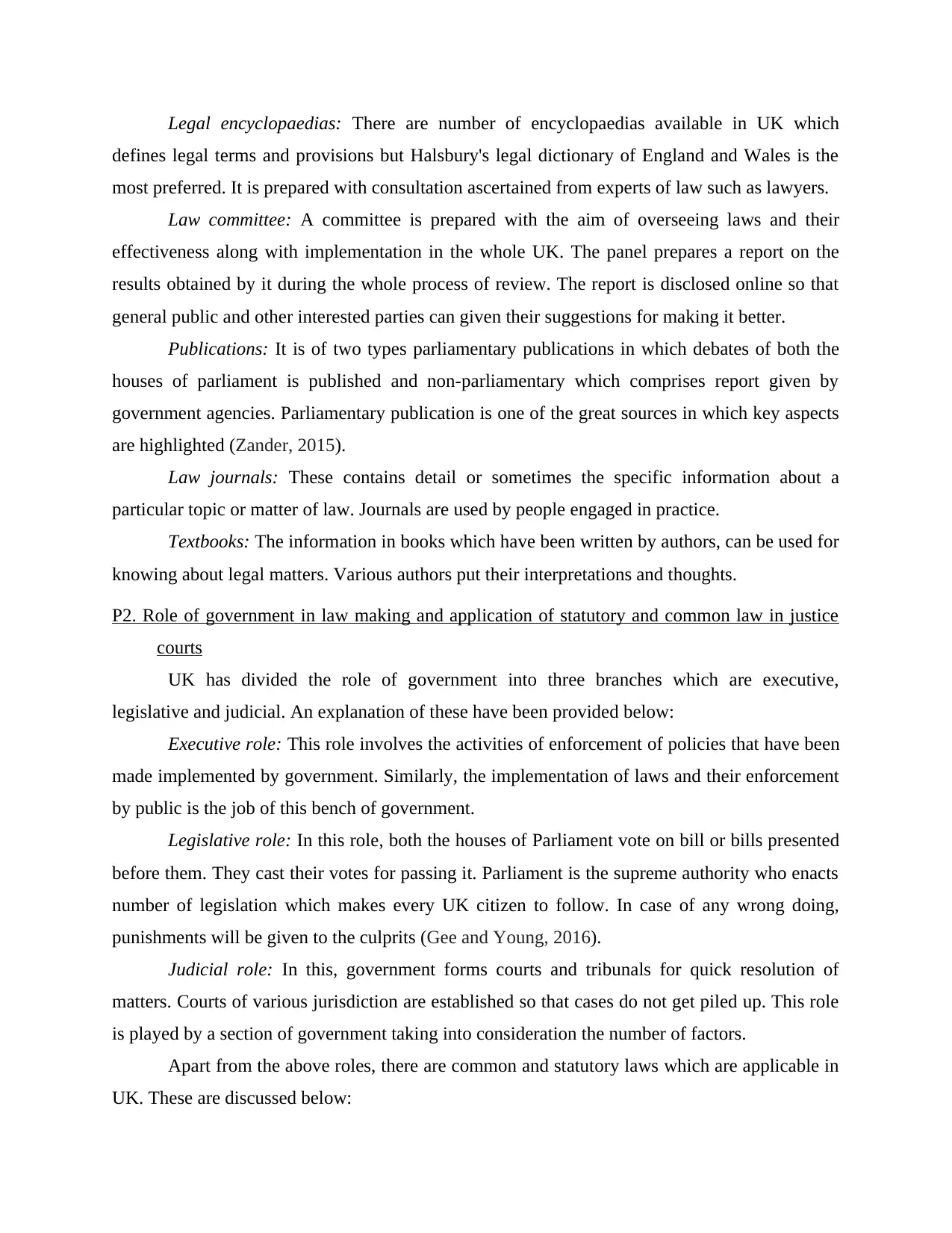
Legal encyclopaedias: There are number of encyclopaedias available in UK which
defines legal terms and provisions but Halsbury's legal dictionary of England and Wales is the
most preferred. It is prepared with consultation ascertained from experts of law such as lawyers.
Law committee: A committee is prepared with the aim of overseeing laws and their
effectiveness along with implementation in the whole UK. The panel prepares a report on the
results obtained by it during the whole process of review. The report is disclosed online so that
general public and other interested parties can given their suggestions for making it better.
Publications: It is of two types parliamentary publications in which debates of both the
houses of parliament is published and non-parliamentary which comprises report given by
government agencies. Parliamentary publication is one of the great sources in which key aspects
are highlighted (Zander, 2015).
Law journals: These contains detail or sometimes the specific information about a
particular topic or matter of law. Journals are used by people engaged in practice.
Textbooks: The information in books which have been written by authors, can be used for
knowing about legal matters. Various authors put their interpretations and thoughts.
P2. Role of government in law making and application of statutory and common law in justice
courts
UK has divided the role of government into three branches which are executive,
legislative and judicial. An explanation of these have been provided below:
Executive role: This role involves the activities of enforcement of policies that have been
made implemented by government. Similarly, the implementation of laws and their enforcement
by public is the job of this bench of government.
Legislative role: In this role, both the houses of Parliament vote on bill or bills presented
before them. They cast their votes for passing it. Parliament is the supreme authority who enacts
number of legislation which makes every UK citizen to follow. In case of any wrong doing,
punishments will be given to the culprits (Gee and Young, 2016).
Judicial role: In this, government forms courts and tribunals for quick resolution of
matters. Courts of various jurisdiction are established so that cases do not get piled up. This role
is played by a section of government taking into consideration the number of factors.
Apart from the above roles, there are common and statutory laws which are applicable in
UK. These are discussed below:
defines legal terms and provisions but Halsbury's legal dictionary of England and Wales is the
most preferred. It is prepared with consultation ascertained from experts of law such as lawyers.
Law committee: A committee is prepared with the aim of overseeing laws and their
effectiveness along with implementation in the whole UK. The panel prepares a report on the
results obtained by it during the whole process of review. The report is disclosed online so that
general public and other interested parties can given their suggestions for making it better.
Publications: It is of two types parliamentary publications in which debates of both the
houses of parliament is published and non-parliamentary which comprises report given by
government agencies. Parliamentary publication is one of the great sources in which key aspects
are highlighted (Zander, 2015).
Law journals: These contains detail or sometimes the specific information about a
particular topic or matter of law. Journals are used by people engaged in practice.
Textbooks: The information in books which have been written by authors, can be used for
knowing about legal matters. Various authors put their interpretations and thoughts.
P2. Role of government in law making and application of statutory and common law in justice
courts
UK has divided the role of government into three branches which are executive,
legislative and judicial. An explanation of these have been provided below:
Executive role: This role involves the activities of enforcement of policies that have been
made implemented by government. Similarly, the implementation of laws and their enforcement
by public is the job of this bench of government.
Legislative role: In this role, both the houses of Parliament vote on bill or bills presented
before them. They cast their votes for passing it. Parliament is the supreme authority who enacts
number of legislation which makes every UK citizen to follow. In case of any wrong doing,
punishments will be given to the culprits (Gee and Young, 2016).
Judicial role: In this, government forms courts and tribunals for quick resolution of
matters. Courts of various jurisdiction are established so that cases do not get piled up. This role
is played by a section of government taking into consideration the number of factors.
Apart from the above roles, there are common and statutory laws which are applicable in
UK. These are discussed below:
Paraphrase This Document
Need a fresh take? Get an instant paraphrase of this document with our AI Paraphraser
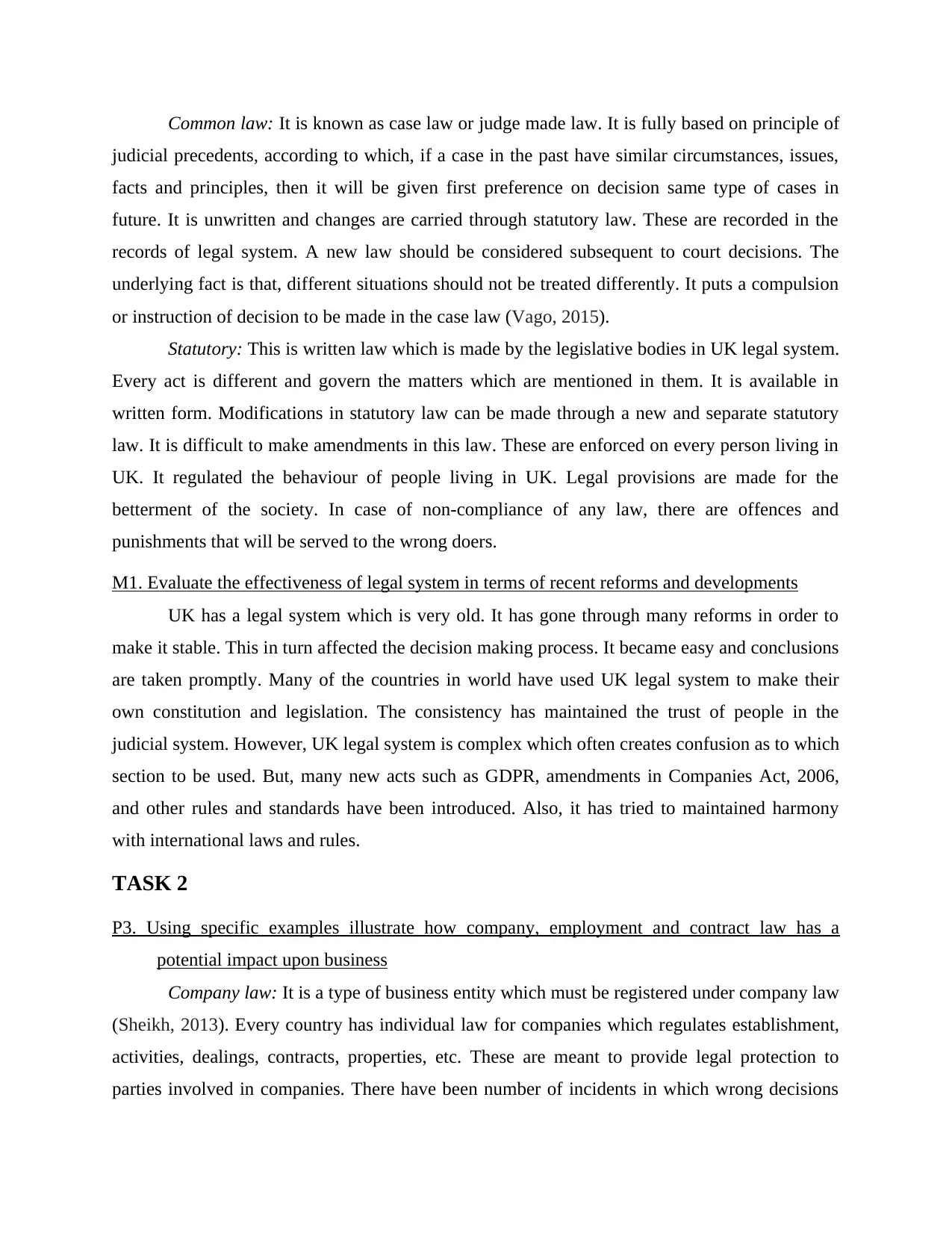
Common law: It is known as case law or judge made law. It is fully based on principle of
judicial precedents, according to which, if a case in the past have similar circumstances, issues,
facts and principles, then it will be given first preference on decision same type of cases in
future. It is unwritten and changes are carried through statutory law. These are recorded in the
records of legal system. A new law should be considered subsequent to court decisions. The
underlying fact is that, different situations should not be treated differently. It puts a compulsion
or instruction of decision to be made in the case law (Vago, 2015).
Statutory: This is written law which is made by the legislative bodies in UK legal system.
Every act is different and govern the matters which are mentioned in them. It is available in
written form. Modifications in statutory law can be made through a new and separate statutory
law. It is difficult to make amendments in this law. These are enforced on every person living in
UK. It regulated the behaviour of people living in UK. Legal provisions are made for the
betterment of the society. In case of non-compliance of any law, there are offences and
punishments that will be served to the wrong doers.
M1. Evaluate the effectiveness of legal system in terms of recent reforms and developments
UK has a legal system which is very old. It has gone through many reforms in order to
make it stable. This in turn affected the decision making process. It became easy and conclusions
are taken promptly. Many of the countries in world have used UK legal system to make their
own constitution and legislation. The consistency has maintained the trust of people in the
judicial system. However, UK legal system is complex which often creates confusion as to which
section to be used. But, many new acts such as GDPR, amendments in Companies Act, 2006,
and other rules and standards have been introduced. Also, it has tried to maintained harmony
with international laws and rules.
TASK 2
P3. Using specific examples illustrate how company, employment and contract law has a
potential impact upon business
Company law: It is a type of business entity which must be registered under company law
(Sheikh, 2013). Every country has individual law for companies which regulates establishment,
activities, dealings, contracts, properties, etc. These are meant to provide legal protection to
parties involved in companies. There have been number of incidents in which wrong decisions
judicial precedents, according to which, if a case in the past have similar circumstances, issues,
facts and principles, then it will be given first preference on decision same type of cases in
future. It is unwritten and changes are carried through statutory law. These are recorded in the
records of legal system. A new law should be considered subsequent to court decisions. The
underlying fact is that, different situations should not be treated differently. It puts a compulsion
or instruction of decision to be made in the case law (Vago, 2015).
Statutory: This is written law which is made by the legislative bodies in UK legal system.
Every act is different and govern the matters which are mentioned in them. It is available in
written form. Modifications in statutory law can be made through a new and separate statutory
law. It is difficult to make amendments in this law. These are enforced on every person living in
UK. It regulated the behaviour of people living in UK. Legal provisions are made for the
betterment of the society. In case of non-compliance of any law, there are offences and
punishments that will be served to the wrong doers.
M1. Evaluate the effectiveness of legal system in terms of recent reforms and developments
UK has a legal system which is very old. It has gone through many reforms in order to
make it stable. This in turn affected the decision making process. It became easy and conclusions
are taken promptly. Many of the countries in world have used UK legal system to make their
own constitution and legislation. The consistency has maintained the trust of people in the
judicial system. However, UK legal system is complex which often creates confusion as to which
section to be used. But, many new acts such as GDPR, amendments in Companies Act, 2006,
and other rules and standards have been introduced. Also, it has tried to maintained harmony
with international laws and rules.
TASK 2
P3. Using specific examples illustrate how company, employment and contract law has a
potential impact upon business
Company law: It is a type of business entity which must be registered under company law
(Sheikh, 2013). Every country has individual law for companies which regulates establishment,
activities, dealings, contracts, properties, etc. These are meant to provide legal protection to
parties involved in companies. There have been number of incidents in which wrong decisions
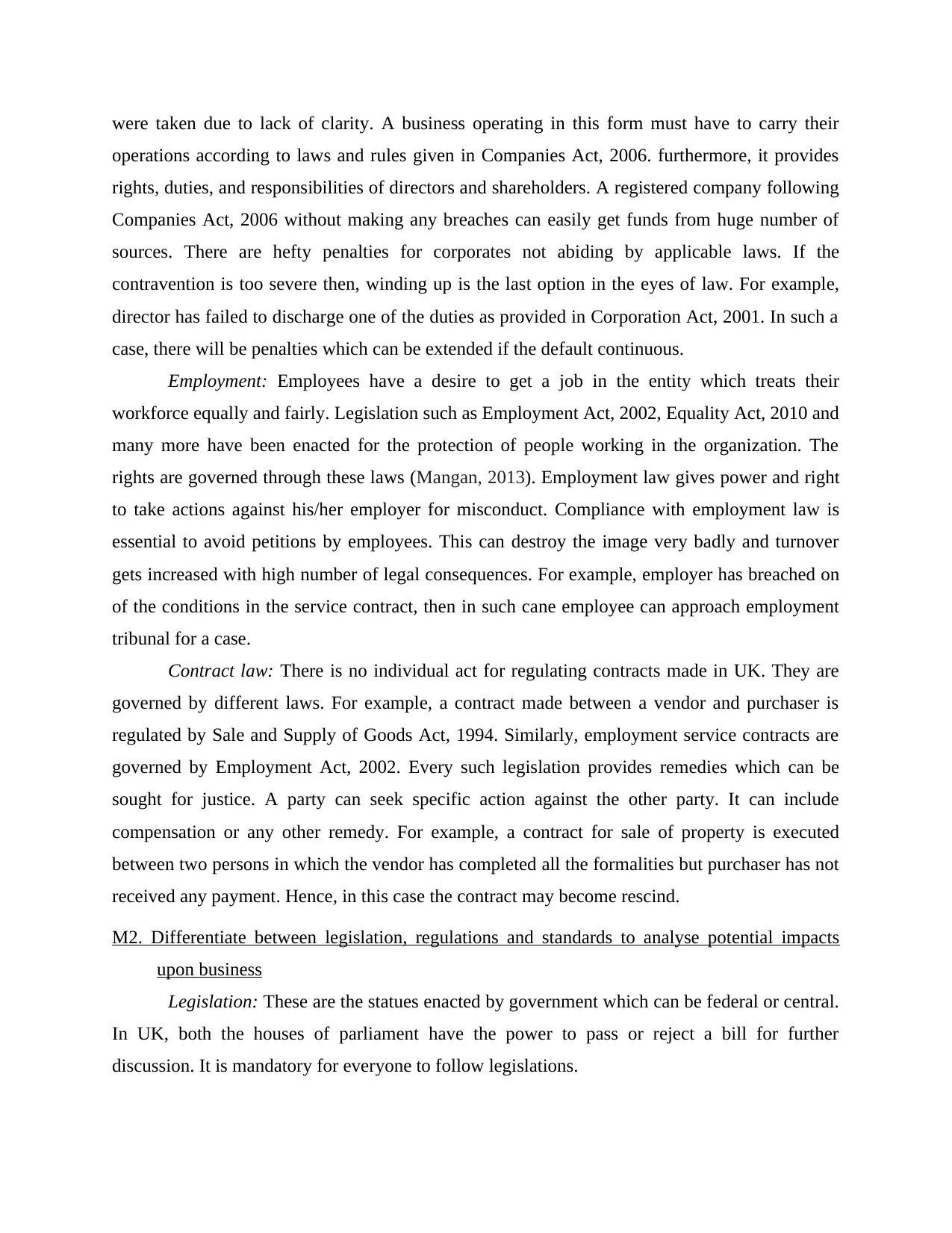
were taken due to lack of clarity. A business operating in this form must have to carry their
operations according to laws and rules given in Companies Act, 2006. furthermore, it provides
rights, duties, and responsibilities of directors and shareholders. A registered company following
Companies Act, 2006 without making any breaches can easily get funds from huge number of
sources. There are hefty penalties for corporates not abiding by applicable laws. If the
contravention is too severe then, winding up is the last option in the eyes of law. For example,
director has failed to discharge one of the duties as provided in Corporation Act, 2001. In such a
case, there will be penalties which can be extended if the default continuous.
Employment: Employees have a desire to get a job in the entity which treats their
workforce equally and fairly. Legislation such as Employment Act, 2002, Equality Act, 2010 and
many more have been enacted for the protection of people working in the organization. The
rights are governed through these laws (Mangan, 2013). Employment law gives power and right
to take actions against his/her employer for misconduct. Compliance with employment law is
essential to avoid petitions by employees. This can destroy the image very badly and turnover
gets increased with high number of legal consequences. For example, employer has breached on
of the conditions in the service contract, then in such cane employee can approach employment
tribunal for a case.
Contract law: There is no individual act for regulating contracts made in UK. They are
governed by different laws. For example, a contract made between a vendor and purchaser is
regulated by Sale and Supply of Goods Act, 1994. Similarly, employment service contracts are
governed by Employment Act, 2002. Every such legislation provides remedies which can be
sought for justice. A party can seek specific action against the other party. It can include
compensation or any other remedy. For example, a contract for sale of property is executed
between two persons in which the vendor has completed all the formalities but purchaser has not
received any payment. Hence, in this case the contract may become rescind.
M2. Differentiate between legislation, regulations and standards to analyse potential impacts
upon business
Legislation: These are the statues enacted by government which can be federal or central.
In UK, both the houses of parliament have the power to pass or reject a bill for further
discussion. It is mandatory for everyone to follow legislations.
operations according to laws and rules given in Companies Act, 2006. furthermore, it provides
rights, duties, and responsibilities of directors and shareholders. A registered company following
Companies Act, 2006 without making any breaches can easily get funds from huge number of
sources. There are hefty penalties for corporates not abiding by applicable laws. If the
contravention is too severe then, winding up is the last option in the eyes of law. For example,
director has failed to discharge one of the duties as provided in Corporation Act, 2001. In such a
case, there will be penalties which can be extended if the default continuous.
Employment: Employees have a desire to get a job in the entity which treats their
workforce equally and fairly. Legislation such as Employment Act, 2002, Equality Act, 2010 and
many more have been enacted for the protection of people working in the organization. The
rights are governed through these laws (Mangan, 2013). Employment law gives power and right
to take actions against his/her employer for misconduct. Compliance with employment law is
essential to avoid petitions by employees. This can destroy the image very badly and turnover
gets increased with high number of legal consequences. For example, employer has breached on
of the conditions in the service contract, then in such cane employee can approach employment
tribunal for a case.
Contract law: There is no individual act for regulating contracts made in UK. They are
governed by different laws. For example, a contract made between a vendor and purchaser is
regulated by Sale and Supply of Goods Act, 1994. Similarly, employment service contracts are
governed by Employment Act, 2002. Every such legislation provides remedies which can be
sought for justice. A party can seek specific action against the other party. It can include
compensation or any other remedy. For example, a contract for sale of property is executed
between two persons in which the vendor has completed all the formalities but purchaser has not
received any payment. Hence, in this case the contract may become rescind.
M2. Differentiate between legislation, regulations and standards to analyse potential impacts
upon business
Legislation: These are the statues enacted by government which can be federal or central.
In UK, both the houses of parliament have the power to pass or reject a bill for further
discussion. It is mandatory for everyone to follow legislations.
⊘ This is a preview!⊘
Do you want full access?
Subscribe today to unlock all pages.

Trusted by 1+ million students worldwide
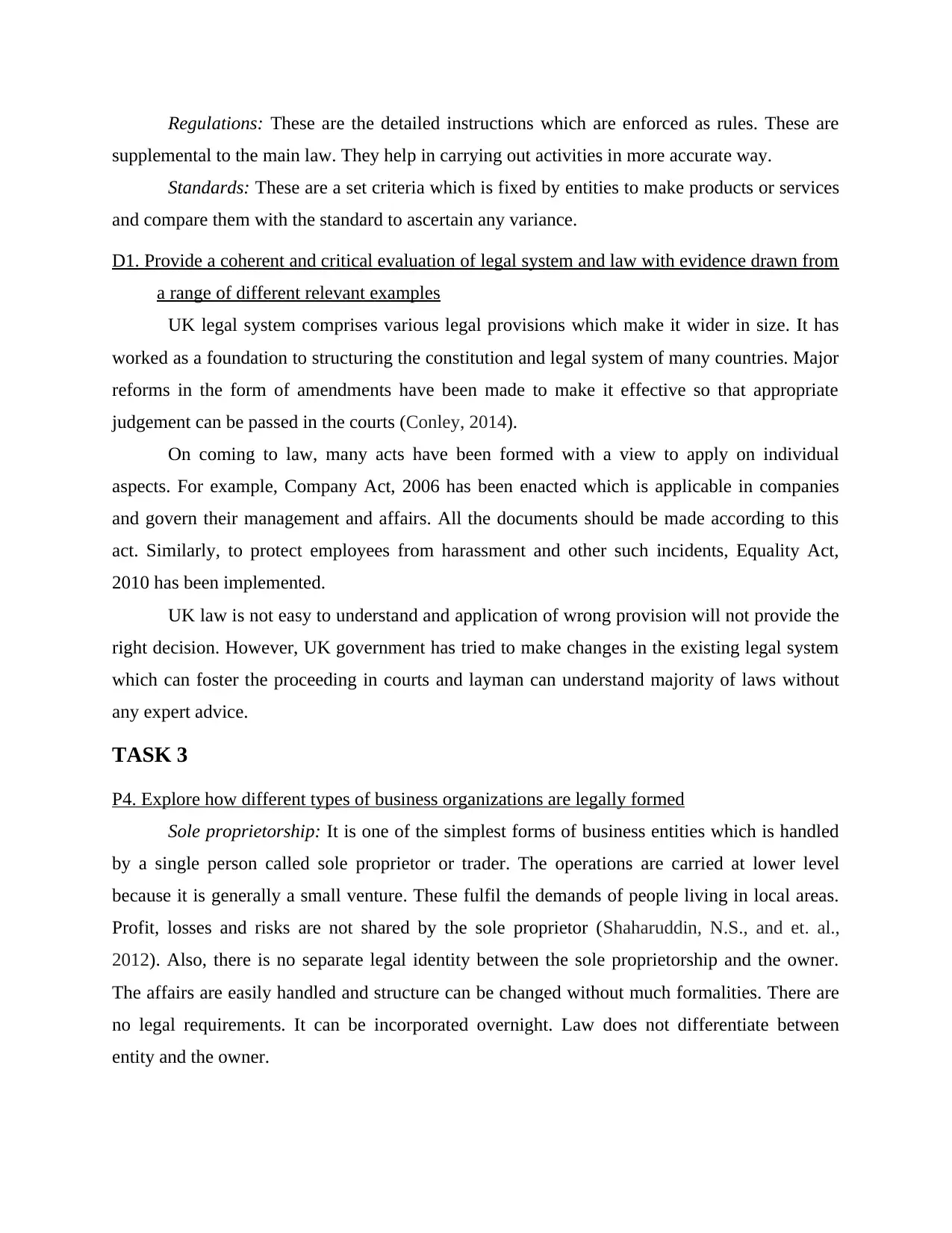
Regulations: These are the detailed instructions which are enforced as rules. These are
supplemental to the main law. They help in carrying out activities in more accurate way.
Standards: These are a set criteria which is fixed by entities to make products or services
and compare them with the standard to ascertain any variance.
D1. Provide a coherent and critical evaluation of legal system and law with evidence drawn from
a range of different relevant examples
UK legal system comprises various legal provisions which make it wider in size. It has
worked as a foundation to structuring the constitution and legal system of many countries. Major
reforms in the form of amendments have been made to make it effective so that appropriate
judgement can be passed in the courts (Conley, 2014).
On coming to law, many acts have been formed with a view to apply on individual
aspects. For example, Company Act, 2006 has been enacted which is applicable in companies
and govern their management and affairs. All the documents should be made according to this
act. Similarly, to protect employees from harassment and other such incidents, Equality Act,
2010 has been implemented.
UK law is not easy to understand and application of wrong provision will not provide the
right decision. However, UK government has tried to make changes in the existing legal system
which can foster the proceeding in courts and layman can understand majority of laws without
any expert advice.
TASK 3
P4. Explore how different types of business organizations are legally formed
Sole proprietorship: It is one of the simplest forms of business entities which is handled
by a single person called sole proprietor or trader. The operations are carried at lower level
because it is generally a small venture. These fulfil the demands of people living in local areas.
Profit, losses and risks are not shared by the sole proprietor (Shaharuddin, N.S., and et. al.,
2012). Also, there is no separate legal identity between the sole proprietorship and the owner.
The affairs are easily handled and structure can be changed without much formalities. There are
no legal requirements. It can be incorporated overnight. Law does not differentiate between
entity and the owner.
supplemental to the main law. They help in carrying out activities in more accurate way.
Standards: These are a set criteria which is fixed by entities to make products or services
and compare them with the standard to ascertain any variance.
D1. Provide a coherent and critical evaluation of legal system and law with evidence drawn from
a range of different relevant examples
UK legal system comprises various legal provisions which make it wider in size. It has
worked as a foundation to structuring the constitution and legal system of many countries. Major
reforms in the form of amendments have been made to make it effective so that appropriate
judgement can be passed in the courts (Conley, 2014).
On coming to law, many acts have been formed with a view to apply on individual
aspects. For example, Company Act, 2006 has been enacted which is applicable in companies
and govern their management and affairs. All the documents should be made according to this
act. Similarly, to protect employees from harassment and other such incidents, Equality Act,
2010 has been implemented.
UK law is not easy to understand and application of wrong provision will not provide the
right decision. However, UK government has tried to make changes in the existing legal system
which can foster the proceeding in courts and layman can understand majority of laws without
any expert advice.
TASK 3
P4. Explore how different types of business organizations are legally formed
Sole proprietorship: It is one of the simplest forms of business entities which is handled
by a single person called sole proprietor or trader. The operations are carried at lower level
because it is generally a small venture. These fulfil the demands of people living in local areas.
Profit, losses and risks are not shared by the sole proprietor (Shaharuddin, N.S., and et. al.,
2012). Also, there is no separate legal identity between the sole proprietorship and the owner.
The affairs are easily handled and structure can be changed without much formalities. There are
no legal requirements. It can be incorporated overnight. Law does not differentiate between
entity and the owner.
Paraphrase This Document
Need a fresh take? Get an instant paraphrase of this document with our AI Paraphraser
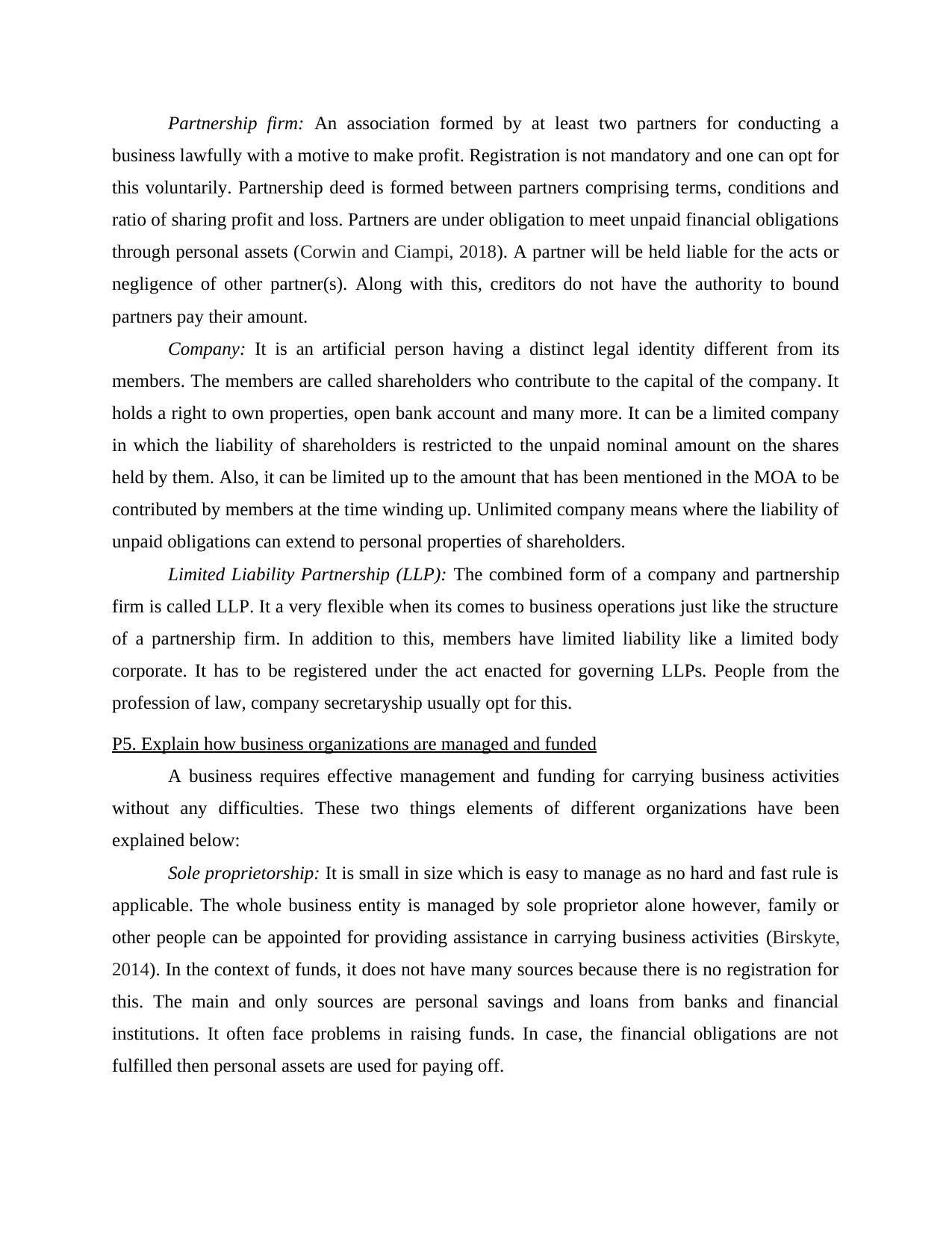
Partnership firm: An association formed by at least two partners for conducting a
business lawfully with a motive to make profit. Registration is not mandatory and one can opt for
this voluntarily. Partnership deed is formed between partners comprising terms, conditions and
ratio of sharing profit and loss. Partners are under obligation to meet unpaid financial obligations
through personal assets (Corwin and Ciampi, 2018). A partner will be held liable for the acts or
negligence of other partner(s). Along with this, creditors do not have the authority to bound
partners pay their amount.
Company: It is an artificial person having a distinct legal identity different from its
members. The members are called shareholders who contribute to the capital of the company. It
holds a right to own properties, open bank account and many more. It can be a limited company
in which the liability of shareholders is restricted to the unpaid nominal amount on the shares
held by them. Also, it can be limited up to the amount that has been mentioned in the MOA to be
contributed by members at the time winding up. Unlimited company means where the liability of
unpaid obligations can extend to personal properties of shareholders.
Limited Liability Partnership (LLP): The combined form of a company and partnership
firm is called LLP. It a very flexible when its comes to business operations just like the structure
of a partnership firm. In addition to this, members have limited liability like a limited body
corporate. It has to be registered under the act enacted for governing LLPs. People from the
profession of law, company secretaryship usually opt for this.
P5. Explain how business organizations are managed and funded
A business requires effective management and funding for carrying business activities
without any difficulties. These two things elements of different organizations have been
explained below:
Sole proprietorship: It is small in size which is easy to manage as no hard and fast rule is
applicable. The whole business entity is managed by sole proprietor alone however, family or
other people can be appointed for providing assistance in carrying business activities (Birskyte,
2014). In the context of funds, it does not have many sources because there is no registration for
this. The main and only sources are personal savings and loans from banks and financial
institutions. It often face problems in raising funds. In case, the financial obligations are not
fulfilled then personal assets are used for paying off.
business lawfully with a motive to make profit. Registration is not mandatory and one can opt for
this voluntarily. Partnership deed is formed between partners comprising terms, conditions and
ratio of sharing profit and loss. Partners are under obligation to meet unpaid financial obligations
through personal assets (Corwin and Ciampi, 2018). A partner will be held liable for the acts or
negligence of other partner(s). Along with this, creditors do not have the authority to bound
partners pay their amount.
Company: It is an artificial person having a distinct legal identity different from its
members. The members are called shareholders who contribute to the capital of the company. It
holds a right to own properties, open bank account and many more. It can be a limited company
in which the liability of shareholders is restricted to the unpaid nominal amount on the shares
held by them. Also, it can be limited up to the amount that has been mentioned in the MOA to be
contributed by members at the time winding up. Unlimited company means where the liability of
unpaid obligations can extend to personal properties of shareholders.
Limited Liability Partnership (LLP): The combined form of a company and partnership
firm is called LLP. It a very flexible when its comes to business operations just like the structure
of a partnership firm. In addition to this, members have limited liability like a limited body
corporate. It has to be registered under the act enacted for governing LLPs. People from the
profession of law, company secretaryship usually opt for this.
P5. Explain how business organizations are managed and funded
A business requires effective management and funding for carrying business activities
without any difficulties. These two things elements of different organizations have been
explained below:
Sole proprietorship: It is small in size which is easy to manage as no hard and fast rule is
applicable. The whole business entity is managed by sole proprietor alone however, family or
other people can be appointed for providing assistance in carrying business activities (Birskyte,
2014). In the context of funds, it does not have many sources because there is no registration for
this. The main and only sources are personal savings and loans from banks and financial
institutions. It often face problems in raising funds. In case, the financial obligations are not
fulfilled then personal assets are used for paying off.
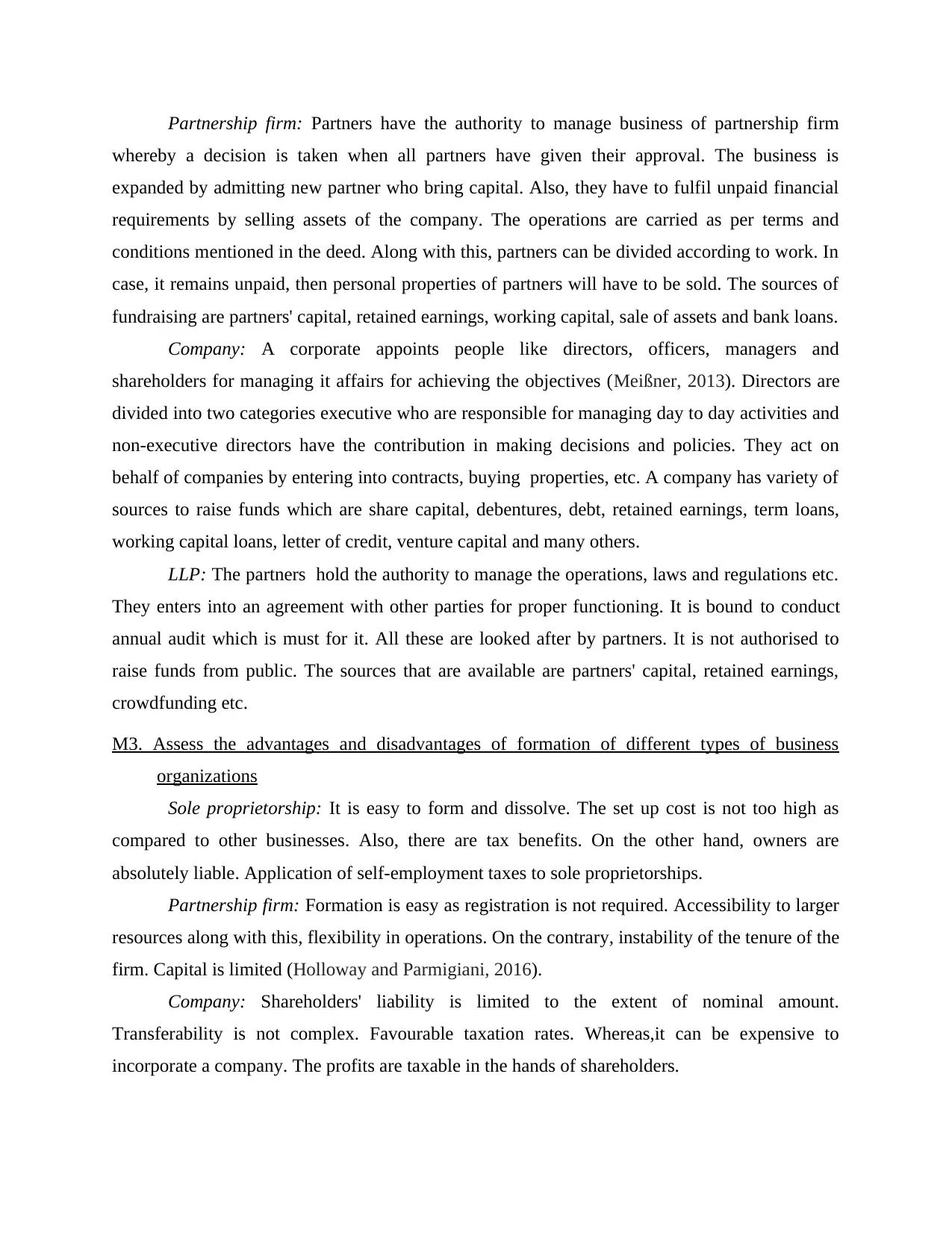
Partnership firm: Partners have the authority to manage business of partnership firm
whereby a decision is taken when all partners have given their approval. The business is
expanded by admitting new partner who bring capital. Also, they have to fulfil unpaid financial
requirements by selling assets of the company. The operations are carried as per terms and
conditions mentioned in the deed. Along with this, partners can be divided according to work. In
case, it remains unpaid, then personal properties of partners will have to be sold. The sources of
fundraising are partners' capital, retained earnings, working capital, sale of assets and bank loans.
Company: A corporate appoints people like directors, officers, managers and
shareholders for managing it affairs for achieving the objectives (Meißner, 2013). Directors are
divided into two categories executive who are responsible for managing day to day activities and
non-executive directors have the contribution in making decisions and policies. They act on
behalf of companies by entering into contracts, buying properties, etc. A company has variety of
sources to raise funds which are share capital, debentures, debt, retained earnings, term loans,
working capital loans, letter of credit, venture capital and many others.
LLP: The partners hold the authority to manage the operations, laws and regulations etc.
They enters into an agreement with other parties for proper functioning. It is bound to conduct
annual audit which is must for it. All these are looked after by partners. It is not authorised to
raise funds from public. The sources that are available are partners' capital, retained earnings,
crowdfunding etc.
M3. Assess the advantages and disadvantages of formation of different types of business
organizations
Sole proprietorship: It is easy to form and dissolve. The set up cost is not too high as
compared to other businesses. Also, there are tax benefits. On the other hand, owners are
absolutely liable. Application of self-employment taxes to sole proprietorships.
Partnership firm: Formation is easy as registration is not required. Accessibility to larger
resources along with this, flexibility in operations. On the contrary, instability of the tenure of the
firm. Capital is limited (Holloway and Parmigiani, 2016).
Company: Shareholders' liability is limited to the extent of nominal amount.
Transferability is not complex. Favourable taxation rates. Whereas,it can be expensive to
incorporate a company. The profits are taxable in the hands of shareholders.
whereby a decision is taken when all partners have given their approval. The business is
expanded by admitting new partner who bring capital. Also, they have to fulfil unpaid financial
requirements by selling assets of the company. The operations are carried as per terms and
conditions mentioned in the deed. Along with this, partners can be divided according to work. In
case, it remains unpaid, then personal properties of partners will have to be sold. The sources of
fundraising are partners' capital, retained earnings, working capital, sale of assets and bank loans.
Company: A corporate appoints people like directors, officers, managers and
shareholders for managing it affairs for achieving the objectives (Meißner, 2013). Directors are
divided into two categories executive who are responsible for managing day to day activities and
non-executive directors have the contribution in making decisions and policies. They act on
behalf of companies by entering into contracts, buying properties, etc. A company has variety of
sources to raise funds which are share capital, debentures, debt, retained earnings, term loans,
working capital loans, letter of credit, venture capital and many others.
LLP: The partners hold the authority to manage the operations, laws and regulations etc.
They enters into an agreement with other parties for proper functioning. It is bound to conduct
annual audit which is must for it. All these are looked after by partners. It is not authorised to
raise funds from public. The sources that are available are partners' capital, retained earnings,
crowdfunding etc.
M3. Assess the advantages and disadvantages of formation of different types of business
organizations
Sole proprietorship: It is easy to form and dissolve. The set up cost is not too high as
compared to other businesses. Also, there are tax benefits. On the other hand, owners are
absolutely liable. Application of self-employment taxes to sole proprietorships.
Partnership firm: Formation is easy as registration is not required. Accessibility to larger
resources along with this, flexibility in operations. On the contrary, instability of the tenure of the
firm. Capital is limited (Holloway and Parmigiani, 2016).
Company: Shareholders' liability is limited to the extent of nominal amount.
Transferability is not complex. Favourable taxation rates. Whereas,it can be expensive to
incorporate a company. The profits are taxable in the hands of shareholders.
⊘ This is a preview!⊘
Do you want full access?
Subscribe today to unlock all pages.

Trusted by 1+ million students worldwide
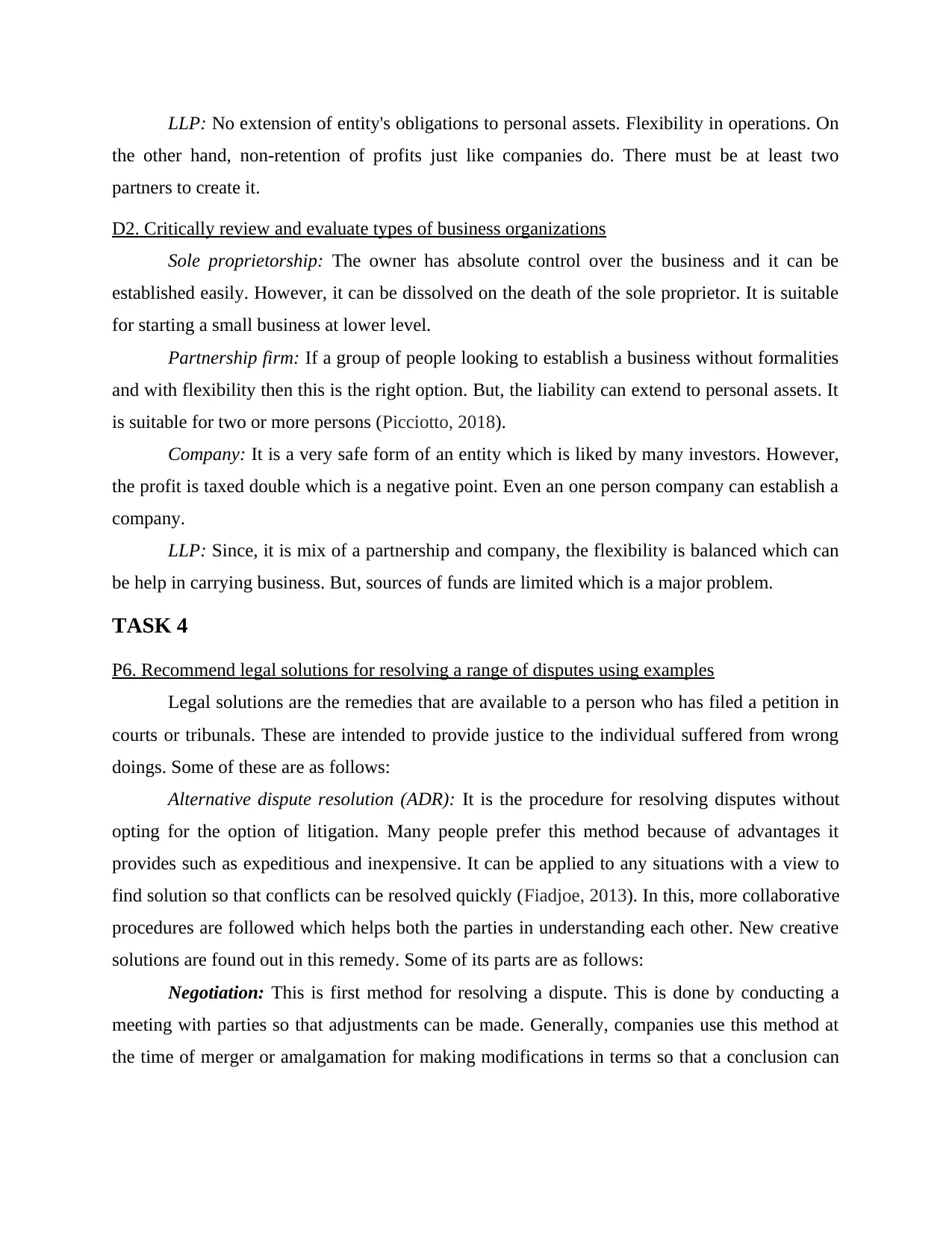
LLP: No extension of entity's obligations to personal assets. Flexibility in operations. On
the other hand, non-retention of profits just like companies do. There must be at least two
partners to create it.
D2. Critically review and evaluate types of business organizations
Sole proprietorship: The owner has absolute control over the business and it can be
established easily. However, it can be dissolved on the death of the sole proprietor. It is suitable
for starting a small business at lower level.
Partnership firm: If a group of people looking to establish a business without formalities
and with flexibility then this is the right option. But, the liability can extend to personal assets. It
is suitable for two or more persons (Picciotto, 2018).
Company: It is a very safe form of an entity which is liked by many investors. However,
the profit is taxed double which is a negative point. Even an one person company can establish a
company.
LLP: Since, it is mix of a partnership and company, the flexibility is balanced which can
be help in carrying business. But, sources of funds are limited which is a major problem.
TASK 4
P6. Recommend legal solutions for resolving a range of disputes using examples
Legal solutions are the remedies that are available to a person who has filed a petition in
courts or tribunals. These are intended to provide justice to the individual suffered from wrong
doings. Some of these are as follows:
Alternative dispute resolution (ADR): It is the procedure for resolving disputes without
opting for the option of litigation. Many people prefer this method because of advantages it
provides such as expeditious and inexpensive. It can be applied to any situations with a view to
find solution so that conflicts can be resolved quickly (Fiadjoe, 2013). In this, more collaborative
procedures are followed which helps both the parties in understanding each other. New creative
solutions are found out in this remedy. Some of its parts are as follows:
Negotiation: This is first method for resolving a dispute. This is done by conducting a
meeting with parties so that adjustments can be made. Generally, companies use this method at
the time of merger or amalgamation for making modifications in terms so that a conclusion can
the other hand, non-retention of profits just like companies do. There must be at least two
partners to create it.
D2. Critically review and evaluate types of business organizations
Sole proprietorship: The owner has absolute control over the business and it can be
established easily. However, it can be dissolved on the death of the sole proprietor. It is suitable
for starting a small business at lower level.
Partnership firm: If a group of people looking to establish a business without formalities
and with flexibility then this is the right option. But, the liability can extend to personal assets. It
is suitable for two or more persons (Picciotto, 2018).
Company: It is a very safe form of an entity which is liked by many investors. However,
the profit is taxed double which is a negative point. Even an one person company can establish a
company.
LLP: Since, it is mix of a partnership and company, the flexibility is balanced which can
be help in carrying business. But, sources of funds are limited which is a major problem.
TASK 4
P6. Recommend legal solutions for resolving a range of disputes using examples
Legal solutions are the remedies that are available to a person who has filed a petition in
courts or tribunals. These are intended to provide justice to the individual suffered from wrong
doings. Some of these are as follows:
Alternative dispute resolution (ADR): It is the procedure for resolving disputes without
opting for the option of litigation. Many people prefer this method because of advantages it
provides such as expeditious and inexpensive. It can be applied to any situations with a view to
find solution so that conflicts can be resolved quickly (Fiadjoe, 2013). In this, more collaborative
procedures are followed which helps both the parties in understanding each other. New creative
solutions are found out in this remedy. Some of its parts are as follows:
Negotiation: This is first method for resolving a dispute. This is done by conducting a
meeting with parties so that adjustments can be made. Generally, companies use this method at
the time of merger or amalgamation for making modifications in terms so that a conclusion can
Paraphrase This Document
Need a fresh take? Get an instant paraphrase of this document with our AI Paraphraser
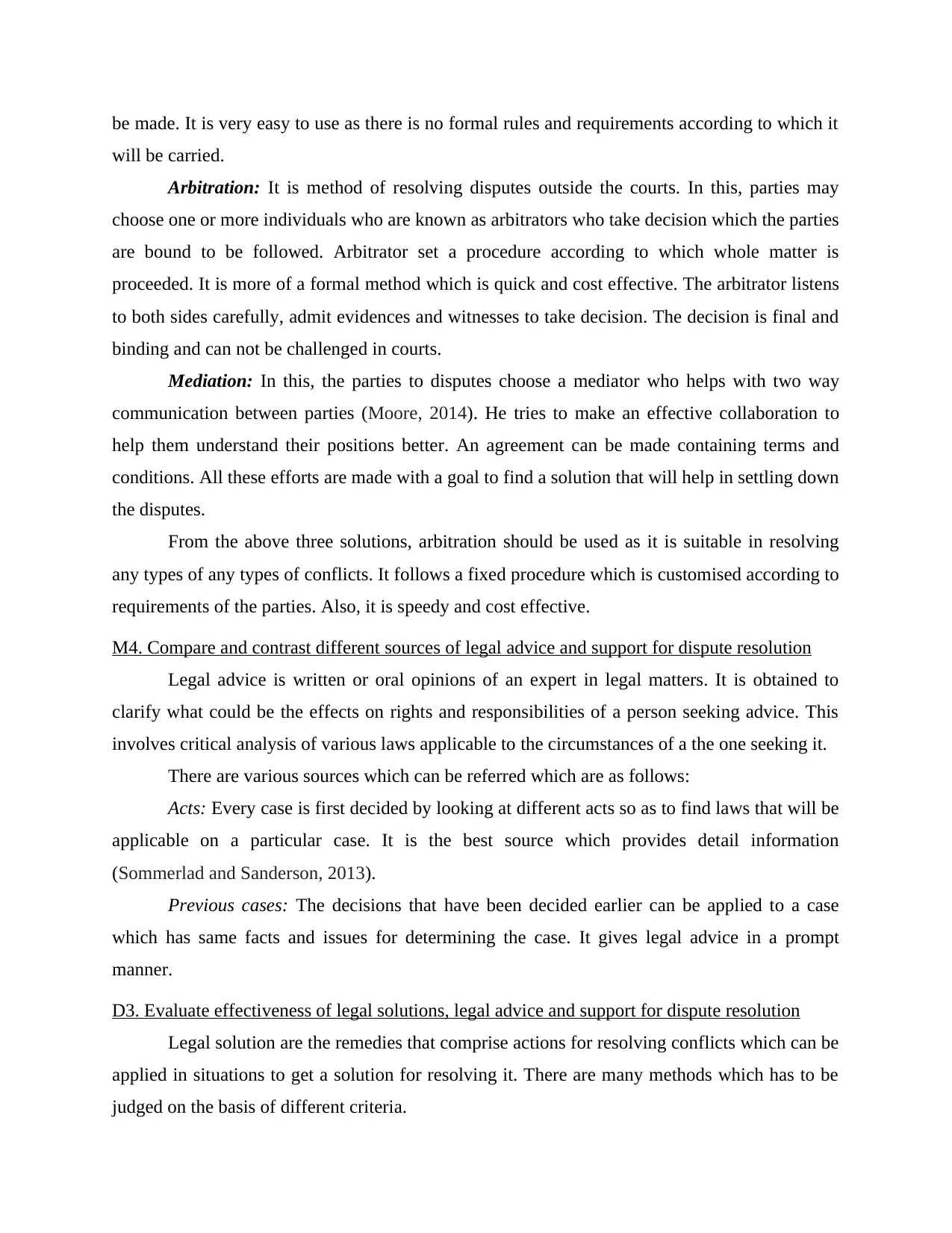
be made. It is very easy to use as there is no formal rules and requirements according to which it
will be carried.
Arbitration: It is method of resolving disputes outside the courts. In this, parties may
choose one or more individuals who are known as arbitrators who take decision which the parties
are bound to be followed. Arbitrator set a procedure according to which whole matter is
proceeded. It is more of a formal method which is quick and cost effective. The arbitrator listens
to both sides carefully, admit evidences and witnesses to take decision. The decision is final and
binding and can not be challenged in courts.
Mediation: In this, the parties to disputes choose a mediator who helps with two way
communication between parties (Moore, 2014). He tries to make an effective collaboration to
help them understand their positions better. An agreement can be made containing terms and
conditions. All these efforts are made with a goal to find a solution that will help in settling down
the disputes.
From the above three solutions, arbitration should be used as it is suitable in resolving
any types of any types of conflicts. It follows a fixed procedure which is customised according to
requirements of the parties. Also, it is speedy and cost effective.
M4. Compare and contrast different sources of legal advice and support for dispute resolution
Legal advice is written or oral opinions of an expert in legal matters. It is obtained to
clarify what could be the effects on rights and responsibilities of a person seeking advice. This
involves critical analysis of various laws applicable to the circumstances of a the one seeking it.
There are various sources which can be referred which are as follows:
Acts: Every case is first decided by looking at different acts so as to find laws that will be
applicable on a particular case. It is the best source which provides detail information
(Sommerlad and Sanderson, 2013).
Previous cases: The decisions that have been decided earlier can be applied to a case
which has same facts and issues for determining the case. It gives legal advice in a prompt
manner.
D3. Evaluate effectiveness of legal solutions, legal advice and support for dispute resolution
Legal solution are the remedies that comprise actions for resolving conflicts which can be
applied in situations to get a solution for resolving it. There are many methods which has to be
judged on the basis of different criteria.
will be carried.
Arbitration: It is method of resolving disputes outside the courts. In this, parties may
choose one or more individuals who are known as arbitrators who take decision which the parties
are bound to be followed. Arbitrator set a procedure according to which whole matter is
proceeded. It is more of a formal method which is quick and cost effective. The arbitrator listens
to both sides carefully, admit evidences and witnesses to take decision. The decision is final and
binding and can not be challenged in courts.
Mediation: In this, the parties to disputes choose a mediator who helps with two way
communication between parties (Moore, 2014). He tries to make an effective collaboration to
help them understand their positions better. An agreement can be made containing terms and
conditions. All these efforts are made with a goal to find a solution that will help in settling down
the disputes.
From the above three solutions, arbitration should be used as it is suitable in resolving
any types of any types of conflicts. It follows a fixed procedure which is customised according to
requirements of the parties. Also, it is speedy and cost effective.
M4. Compare and contrast different sources of legal advice and support for dispute resolution
Legal advice is written or oral opinions of an expert in legal matters. It is obtained to
clarify what could be the effects on rights and responsibilities of a person seeking advice. This
involves critical analysis of various laws applicable to the circumstances of a the one seeking it.
There are various sources which can be referred which are as follows:
Acts: Every case is first decided by looking at different acts so as to find laws that will be
applicable on a particular case. It is the best source which provides detail information
(Sommerlad and Sanderson, 2013).
Previous cases: The decisions that have been decided earlier can be applied to a case
which has same facts and issues for determining the case. It gives legal advice in a prompt
manner.
D3. Evaluate effectiveness of legal solutions, legal advice and support for dispute resolution
Legal solution are the remedies that comprise actions for resolving conflicts which can be
applied in situations to get a solution for resolving it. There are many methods which has to be
judged on the basis of different criteria.
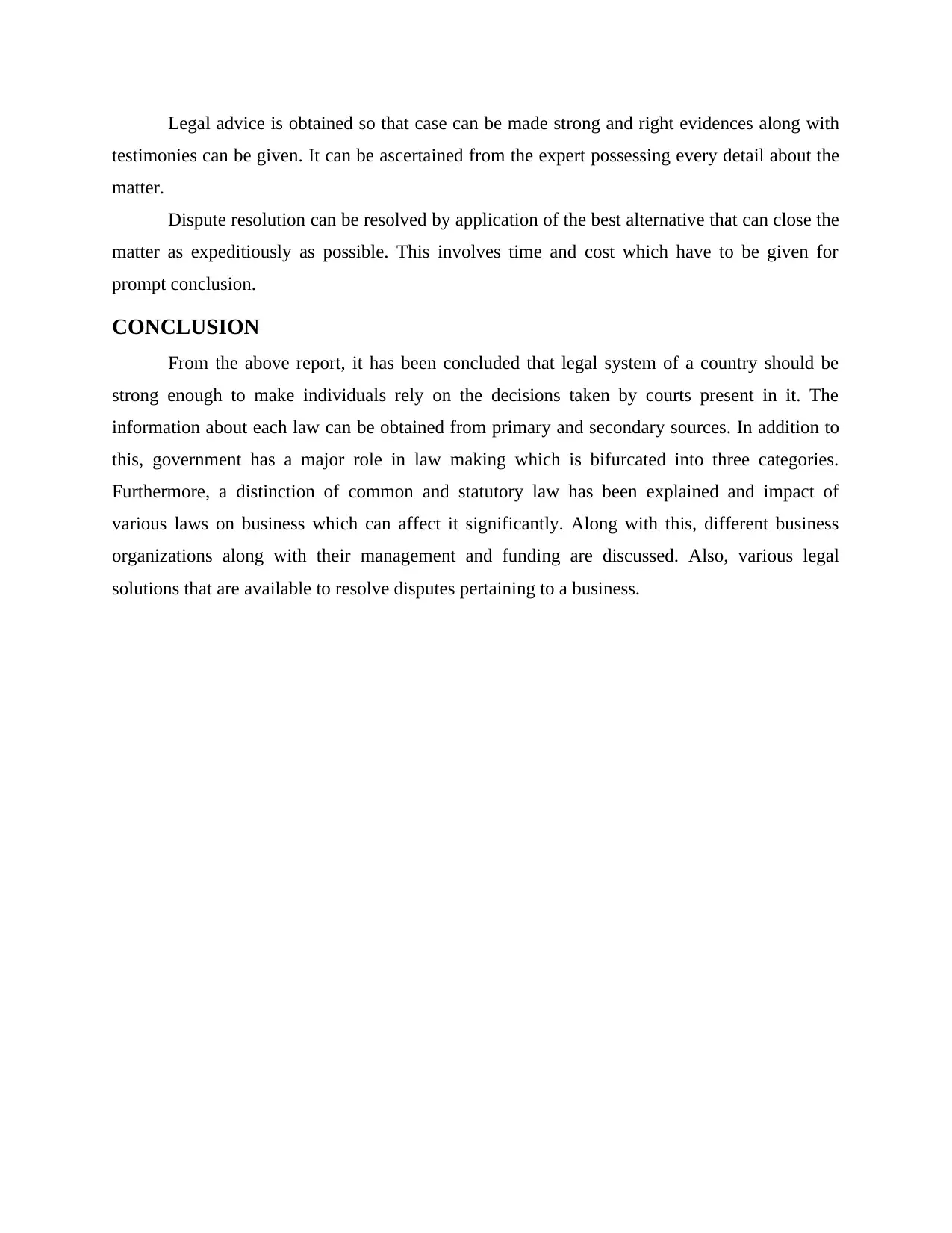
Legal advice is obtained so that case can be made strong and right evidences along with
testimonies can be given. It can be ascertained from the expert possessing every detail about the
matter.
Dispute resolution can be resolved by application of the best alternative that can close the
matter as expeditiously as possible. This involves time and cost which have to be given for
prompt conclusion.
CONCLUSION
From the above report, it has been concluded that legal system of a country should be
strong enough to make individuals rely on the decisions taken by courts present in it. The
information about each law can be obtained from primary and secondary sources. In addition to
this, government has a major role in law making which is bifurcated into three categories.
Furthermore, a distinction of common and statutory law has been explained and impact of
various laws on business which can affect it significantly. Along with this, different business
organizations along with their management and funding are discussed. Also, various legal
solutions that are available to resolve disputes pertaining to a business.
testimonies can be given. It can be ascertained from the expert possessing every detail about the
matter.
Dispute resolution can be resolved by application of the best alternative that can close the
matter as expeditiously as possible. This involves time and cost which have to be given for
prompt conclusion.
CONCLUSION
From the above report, it has been concluded that legal system of a country should be
strong enough to make individuals rely on the decisions taken by courts present in it. The
information about each law can be obtained from primary and secondary sources. In addition to
this, government has a major role in law making which is bifurcated into three categories.
Furthermore, a distinction of common and statutory law has been explained and impact of
various laws on business which can affect it significantly. Along with this, different business
organizations along with their management and funding are discussed. Also, various legal
solutions that are available to resolve disputes pertaining to a business.
⊘ This is a preview!⊘
Do you want full access?
Subscribe today to unlock all pages.

Trusted by 1+ million students worldwide
1 out of 13
Related Documents
Your All-in-One AI-Powered Toolkit for Academic Success.
+13062052269
info@desklib.com
Available 24*7 on WhatsApp / Email
![[object Object]](/_next/static/media/star-bottom.7253800d.svg)
Unlock your academic potential
Copyright © 2020–2026 A2Z Services. All Rights Reserved. Developed and managed by ZUCOL.


